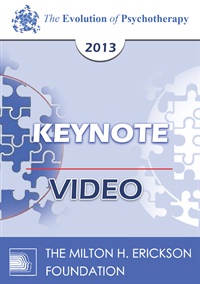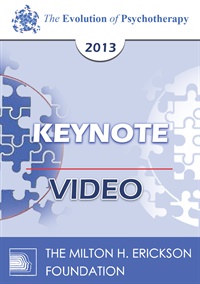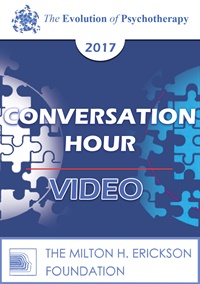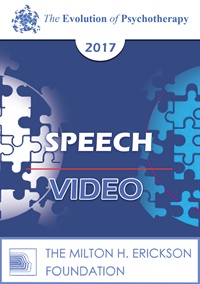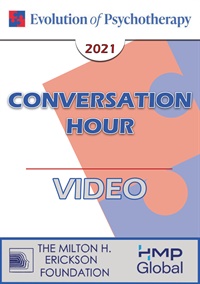
- Average Rating:
- Not yet rated
- Topic Areas:
- Workshops | Research | Brief Therapy | History of Psychotherapy | Psychotherapy
- Categories:
- Brief Therapy Conference | Brief Therapy Conference 2006
- Faculty:
- Scott Miller, PhD
- Duration:
- 2:03:53
- Format:
- Audio Only
- Original Program Date:
- Dec 07, 2006
- Short Description:
- At last count, over 400 separate models of psychotherapy have been found to exist (Garfield & Bergin, 1994). Despite the claims and promises made by the proponents of the various treatment models, 40 years of increasingly sophisticated outcome research has not found any one model or technique superior for the resolution of the problems that clients bring into treatment, Indeed, most of the research has only confirmed "common sense" (Frank 1993). In this workshop, forty years of outcome research will be translated into practical, common sense and empirically supported therapeutic skills that you can use for the efficient and effective resolution of the problems that clients bring to treatment.
- Price:
- $15.00 - Base Price
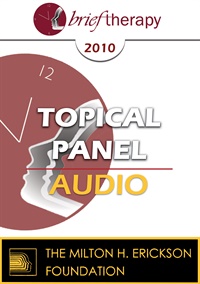
- Average Rating:
- Not yet rated
- Topic Areas:
- Milton Erickson | Topical Panels | Ericksonian Hypnosis and Therapy Techniques | Ericksonian Psychotherapy | History of Psychotherapy
- Categories:
- Brief Therapy Conference | Brief Therapy Conference 2010
- Faculty:
- Steve Andreas, MA, NLP | Stephen Gilligan, PhD | Bill O'Hanlon, MS | Jeffrey Zeig, PhD
- Duration:
- 58:29
- Format:
- Audio Only
- Original Program Date:
- Dec 11, 2010
- Short Description:
- This topical panel paints a rich, multi-angled portrait of Milton Erickson through personal stories, clinical memories, and lived encounters. Panelists reflect on his use of confusion, implication, humor, and nonverbal attunement, while exploring the humility, curiosity, and generosity that shaped both his work and his enduring influence on psychotherapy.
- Price:
- $15.00 - Base Price
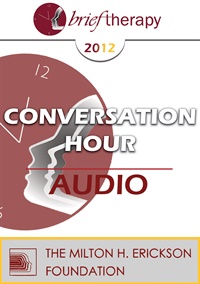
- Average Rating:
- Not yet rated
- Topic Areas:
- Conversation Hours | Therapist Development | Brief Therapy | History of Psychotherapy
- Categories:
- Brief Therapy Conference | Brief Therapy Conference 2012
- Faculty:
- Erving Polster, PhD
- Duration:
- 58:34
- Format:
- Audio Only
- Original Program Date:
- Dec 07, 2012
- Short Description:
- BT12 Conversation Hour 04 - Key Changes in Perspective over a 70-Year Career - Erving Polster, PhD Educational Objectives: Learn the philosophies of various practitioners and theorists.
- Price:
- $15.00 - Base Price
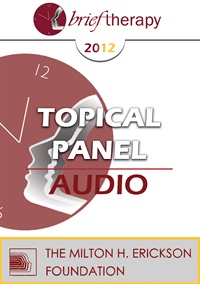
- Average Rating:
- Not yet rated
- Topic Areas:
- Milton Erickson | Topical Panels | Ericksonian Hypnosis and Therapy Techniques | Ericksonian Psychotherapy | History of Psychotherapy
- Categories:
- Brief Therapy Conference | Brief Therapy Conference 2012
- Faculty:
- Steve Andreas, MA, NLP | Robert Dilts, BA | Bill O'Hanlon, MS | Roxanna Erickson Klein, RN, PhD, LPC, LCDC
- Duration:
- 1:01:54
- Format:
- Audio Only
- Original Program Date:
- Dec 07, 2012
- Short Description:
- This topical panel offers a vivid, personal portrait of Milton Erickson through stories, reflections, and lived encounters. Panelists explore the qualities that shaped his influence, including curiosity, playfulness, generosity, and deep observational skill, while tracing how his spirit of experimentation and respect for human potential continues to ripple through psychotherapy today.
- Price:
- $15.00 - Base Price
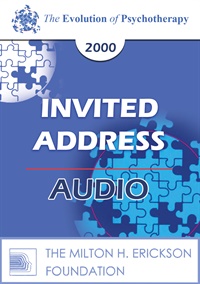
- Average Rating:
- Not yet rated
- Topic Areas:
- Invited Addresses | History of Psychotherapy | Therapy Practice
- Categories:
- Evolution of Psychotherapy | Evolution of Psychotherapy 2000 | Pioneers in Couples and Family Therapy
- Faculty:
- Jay Haley, MA | Otto Kernberg, MD
- Duration:
- 1 Hour 16 Minutes
- Format:
- Audio Only
- Original Program Date:
- May 29, 2000
- Short Description:
- This address traces key shifts in psychotherapy, from the rise of family and brief therapy to evolving views on the unconscious and client privacy. It addresses the tension between therapy as science versus art and considers its role in settings like corrections and foster care. The importance of ethical standards and clearly defining psychotherapy is emphasized. Afterwards there is a discussion, including Otto Kernberg offering commentary on what he calls Haley's oversimplification of therapy history.
- Price:
- $15.00 - Base Price
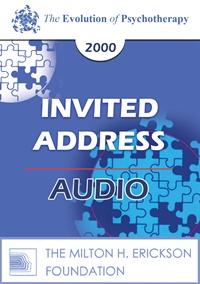
- Average Rating:
- Not yet rated
- Topic Areas:
- Invited Addresses | Psychotherapy | History of Psychotherapy | Psychoanalysis
- Categories:
- Evolution of Psychotherapy | Evolution of Psychotherapy 2000
- Faculty:
- Judd Marmor | James Bugental, PhD
- Duration:
- 1 Hour 28 Minutes
- Format:
- Audio Only
- Original Program Date:
- May 29, 2000
- Short Description:
- This address is a review of the significant theoretical and practical changes in the practice of psychoanalytically-oriented psychotherapy in the experience of the author's personal practice over the past 62 years.
- Price:
- $15.00 - Base Price

- Average Rating:
- Not yet rated
- Topic Areas:
- Psychotherapy | Invited Addresses | Brief Therapy | History of Psychotherapy
- Categories:
- Evolution of Psychotherapy | Evolution of Psychotherapy 2000
- Faculty:
- Mary Goulding, MSW | Ernest Rossi, PhD
- Duration:
- 1 Hour 24 Minutes
- Format:
- Audio Only
- Original Program Date:
- May 26, 2000
- Short Description:
- Beginning with what she learned from Fritz Perls, Eric Berne, Virginia Satir and Robert Goulding, Mrs. Goulding will discuss her current method of teaching and practicing psychotherapy.
- Price:
- $15.00 - Base Price
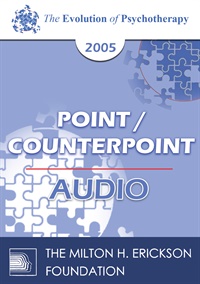
- Average Rating:
- Not yet rated
- Topic Areas:
- Point/Counterpoint Sessions | Psychotherapy | History of Psychotherapy | Systems Theory
- Categories:
- Evolution of Psychotherapy | Evolution of Psychotherapy 2005 | Pioneers in Couples and Family Therapy
- Faculty:
- Salvador Minuchin, MD | John Gottman, PhD | Julie Gottman, PhD
- Duration:
- 1 Hour 19 Minutes
- Format:
- Audio Only
- Original Program Date:
- Dec 08, 2005
- Short Description:
- This session traces the arc of family therapy from its early directive roots to more collaborative, systemic practices. Minuchin reflects on his shift in stance and introduces a four-step assessment model. The Gottmans contribute research-based insights on friendship, conflict, and emotional intelligence in couples, emphasizing tailored approaches and the enduring nature of many relationship challenges.
- Price:
- $15.00 - Base Price
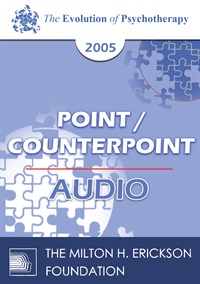
- Average Rating:
- Not yet rated
- Topic Areas:
- Point/Counterpoint Sessions | Psychotherapy | History of Psychotherapy | Life Focus Community
- Categories:
- Evolution of Psychotherapy | Evolution of Psychotherapy 2005
- Faculty:
- Erving Polster, PhD | William Glasser, MD
- Duration:
- 1 Hour 19 Minutes
- Format:
- Audio Only
- Original Program Date:
- Dec 08, 2005
- Short Description:
- Historically, psychotherapists have worked with individuals, small groups, large groups and organizations. We have moved from treating pathology to facilitating personal growth to expanding public consciousness. A next step is the life-long guidance of congregations of people. With religion as a precedent, and large group formation as an instrument, Dr. Polster will show how we may address the everyday, non-pathological needs of the community at large, spelling out some of these procedures and their theoretical underpinnings.
- Price:
- $15.00 - Base Price

- Average Rating:
- Not yet rated
- Topic Areas:
- Point/Counterpoint Sessions | Neurobiology | Object Relations Theory | Psychotherapy | Attachment | History of Psychotherapy
- Categories:
- Evolution of Psychotherapy | Evolution of Psychotherapy 2005
- Faculty:
- James F. Masterson, MD | Erving Polster, PhD
- Duration:
- 1 Hour 18 Minutes
- Format:
- Audio Only
- Original Program Date:
- Dec 10, 2005
- Short Description:
- This talk first briefly reviews the history of the Developmental, Self and Object Relations theoretical approach to the personality disorders as a preface to exploring the latest additions to the theory, i.e., Attachment Theory and Neurobiological Development of the Self in the Right Brain. Attachment Theory: The work of Ainsworth and others is described leading to the attachment categories in the infant and the adult. Many follow-up studies are presented validating the persistence of the categories over time. Neurobiologic Development of the Self in the Right Brain: The work of Alan Schore, Ph.D. is used to describe the development of the self in the right prefrontal cortex of the brain. Integration: The integration of the two theories with the object relations approach are described and illustrated through therapeutic alliance
- Price:
- $15.00 - Base Price
- Average Rating:
- Not yet rated
- Topic Areas:
- State of the Art Address | Psychotherapy | History of Psychotherapy
- Categories:
- Evolution of Psychotherapy | Evolution of Psychotherapy 2005
- Faculty:
- Nicholas Cummings, PhD
- Course Levels:
- Master Degree or Higher in Health-Related Field
- Duration:
- 1:01:58
- Format:
- Audio and Video
- Original Program Date:
- Dec 10, 2005
- Short Description:
- Psychotherapy practice, as we know it today, was born in World War II. Dr. Cummings was there, working with paratroopers in combat, and he has been a psychotherapist and mental health activist in the 60 years since. He wrote the first prepaid psychotherapy insurance benefit in the late 1950s and demonstrated that psychotherapy should be part of all health insurance. He has been in the forefront as an active participant in psychotherapy's achievements, setbacks and hopes for the future. This address will highlight the 60 years of psychotherapy's evolution through the life of one of its leaders.
- Price:
-
Sale is $29.00
price reduced from Base Price - $59.00
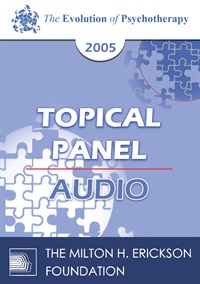
- Average Rating:
- Not yet rated
- Topic Areas:
- Topical Panels | Psychotherapy | History of Psychotherapy
- Categories:
- Evolution of Psychotherapy | Evolution of Psychotherapy 2005
- Faculty:
- Albert Bandura | Nicholas Cummings, PhD | Albert Ellis, PhD | Thomas Szasz, MD
- Duration:
- 1 Hour 4 Minutes
- Format:
- Audio Only
- Original Program Date:
- Dec 09, 2005
- Short Description:
- This panel looks back from 2005 at the rapid, often contentious evolution of psychotherapy, as foundational figures reflect on theory, practice, ethics, economics, and professional identity. Moving from behaviorism and cognitive approaches to questions of evidence, power, third-party payment, and the human relationship at the heart of therapy, the conversation captures both the breakthroughs and the unresolved tensions that shaped the field. It offers therapists and students a rare, candid view of psychotherapy’s struggles and ongoing questions about purpose, values, and who ultimately defines the work.
- Price:
- $15.00 - Base Price
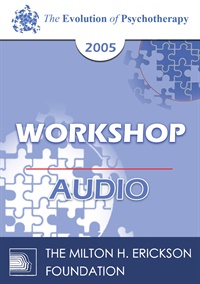
- Average Rating:
- Not yet rated
- Topic Areas:
- Workshops | History of Psychotherapy | Psychotherapy
- Categories:
- Evolution of Psychotherapy | Evolution of Psychotherapy 2005
- Faculty:
- Thomas Szasz, MD
- Duration:
- 2 Hours 33 Minutes
- Format:
- Audio Only
- Original Program Date:
- Dec 07, 2005
- Short Description:
- Dr. Szasz will compare and contrast the psychiatric and social scene in the late 1950's when he wrote The Myth of Menta/Illness, with the present psychiatric and social scenes. He will speculate about the impact of that book on psychiatric and psychotherapeutic thought and practice. Active audience participation is encouraged.
- Price:
- $15.00 - Base Price
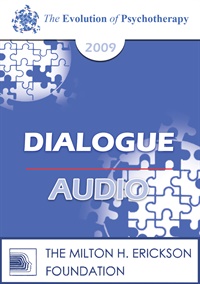
- Average Rating:
- Not yet rated
- Topic Areas:
- Meditation, Spirituality and Yoga | Dialogues | Psychotherapy | History of Psychotherapy
- Categories:
- Evolution of Psychotherapy | Evolution of Psychotherapy 2009 | Pioneers in Couples and Family Therapy
- Faculty:
- Jean Houston, PhD | Cloe Madanes, HDL, LIC
- Duration:
- 39 Minutes
- Format:
- Audio Only
- Original Program Date:
- Dec 11, 2009
- Short Description:
- This discussion examines the evolving role of spirituality in modern life. Topics include integrating ancient practices with contemporary consciousness, fostering partnership-oriented spirituality, and addressing fundamentalism. From a therapeutic angle, the dialogue highlights the role of spiritual pain in trauma, particularly in cases of violence, and presents a 15-step rehabilitation method for juvenile sex offenders focused on repentance, reparation, and healing.
- Price:
- $15.00 - Base Price
- Average Rating:
- Not yet rated
- Topic Areas:
- Family Therapy | Keynotes | Psychotherapy | History of Psychotherapy
- Categories:
- Evolution of Psychotherapy | Evolution of Psychotherapy 2009 | Pioneers in Couples and Family Therapy
- Faculty:
- Salvador Minuchin, MD
- Course Levels:
- Master Degree or Higher in Health-Related Field
- Duration:
- 1:12
- Format:
- Audio and Video
- Original Program Date:
- Dec 12, 2009
- Short Description:
- Minuchin reflects on the evolution of family therapy, contrasting its growth in Europe with its decline in the U.S. He shares an assessment model rooted in his early work at Willowbrook and shaped by cultural diversity. Drawing on influences from feminist, narrative, and systemic approaches, he advocates for family members as active agents of healing and critiques the overuse of medication in child treatment.
- Price:
- $29.00 - Base Price
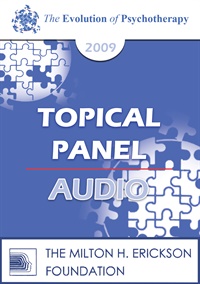
- Average Rating:
- Not yet rated
- Topic Areas:
- Psychotherapy | Topical Panels | History of Psychotherapy
- Categories:
- Evolution of Psychotherapy | Evolution of Psychotherapy 2009
- Faculty:
- Albert Bandura | Otto Kernberg, MD | Donald Meichenbaum, PhD
- Duration:
- 56 Minutes
- Format:
- Audio Only
- Original Program Date:
- Dec 11, 2009
- Short Description:
- This panel traces the major turning points in the history of psychotherapy through a sharp, often candid exchange among leading theorists. Moving across social learning theory, psychodynamic traditions, cognitive-behavioral approaches, and critiques of the disease model, the discussion examines how ideas about change, agency, evidence, and mechanism have evolved over time. Rather than offering a tidy narrative, the conversation exposes the tensions, disagreements, and hard-earned shifts in thinking that continue to shape how psychotherapy is practiced, taught, and researched today.
- Price:
- $15.00 - Base Price
- Average Rating:
- Not yet rated
- Topic Areas:
- Psychotherapy | Invited Addresses | History of Psychotherapy
- Categories:
- Evolution of Psychotherapy | Evolution of Psychotherapy 2013
- Faculty:
- Scott Miller, PhD
- Course Levels:
- Master Degree or Higher in Health-Related Field
- Duration:
- 56:15
- Format:
- Audio and Video
- Original Program Date:
- Dec 13, 2013
- Short Description:
- Since the first “Evolution” conference in 1985, thousands of research studies and how-to books on psychotherapy have been published. Workshops, training programs, and certifications abound. At the same time, the overall effectiveness of psychotherapy has not improved a single percentage point. Meanwhile, practitioners face the most challenging economic practice climate in the field’s history. Incomes are down and fewer people are seeking psychotherapy as a remedy to their problems.
- Price:
-
Sale is $29.00
price reduced from Base Price - $59.00
- Average Rating:
- Not yet rated
- Topic Areas:
- Family Therapy | Keynotes | Psychotherapy | Systems Theory | History of Psychotherapy
- Categories:
- Evolution of Psychotherapy | Evolution of Psychotherapy 2013 | Pioneers in Couples and Family Therapy
- Faculty:
- Salvador Minuchin, MD | Jeffrey Zeig, PhD
- Course Levels:
- Master Degree or Higher in Health-Related Field
- Duration:
- 55:34
- Format:
- Audio and Video
- Original Program Date:
- Dec 11, 2013
- Short Description:
- In conversation with Jeffrey Zeig, Minuchin reflects on his life’s work and the evolution of family therapy. He shares how his early experiences shaped his belief in disrupting certainty and making families central to the healing process. The dialogue explores core principles of systemic therapy, the therapist’s role in shaping change, and the ongoing relevance of context and connection in clinical work.
- Price:
-
Sale is $29.00
price reduced from Base Price - $59.00
- Average Rating:
- Not yet rated
- Topic Areas:
- Keynotes | Psychotherapy | Cognitive Behavior Therapy (CBT) | History of Psychotherapy
- Categories:
- Evolution of Psychotherapy | Evolution of Psychotherapy 2013
- Faculty:
- Aaron Beck, MD
- Course Levels:
- Master Degree or Higher in Health-Related Field
- Duration:
- 1:02:55
- Format:
- Audio and Video
- Original Program Date:
- Dec 15, 2013
- Short Description:
- The discussion will center on the evolution of the cognitive model of psychopathology and psychotherapy since its earlier stage. The expansion of therapy has included all of the common disorders and many of the medically related disorders will be explored. Finally, we will focus on the future of cognitive therapy and psychotherapy in general. Special attention will be paid to the relationship of other psychotherapies.
- Price:
-
Sale is $29.00
price reduced from Base Price - $59.00
- Average Rating:
- Not yet rated
- Topic Areas:
- Psychotherapy | Topical Panels | History of Psychotherapy
- Categories:
- Evolution of Psychotherapy | Evolution of Psychotherapy 2013
- Faculty:
- Albert Bandura | Nicholas Cummings, PhD | Otto Kernberg, MD
- Course Levels:
- Master Degree or Higher in Health-Related Field
- Duration:
- 58:00
- Format:
- Audio and Video
- Original Program Date:
- Dec 13, 2013
- Short Description:
- This panel offers a vivid, firsthand history of psychotherapy as told by figures who helped shape it. Through stories from wartime psychology, psychoanalysis, brief therapy, group work, and the rise of medication, the conversation traces how the field evolved through conflict, innovation, and shifting cultural values. Rather than a tidy timeline, it reveals psychotherapy as a living discipline shaped by ideas, institutions, economics, and human need, raising timely questions about where the field has been and where it may be headed.
- Price:
-
Sale is $29.00
price reduced from Base Price - $59.00
Credit available - Click Here for more information
- Average Rating:
- Not yet rated
- Topic Areas:
- Conversation Hours | Positive Psychology | History of Psychotherapy | Psychology | Psychotherapy
- Categories:
- Evolution of Psychotherapy | Evolution of Psychotherapy 2017 | Online Continuing Education
- Faculty:
- Martin Seligman, PhD
- Course Levels:
- Master Degree or Higher in Health-Related Field
- Duration:
- 1:00:51
- Format:
- Audio and Video
- Original Program Date:
- Dec 16, 2017
- Short Description:
- I will review the past, present, and future of Learned Helplessness, Preparedness, Learned Optimism, Prospective Psychology and Positive Psychology.
- Price:
-
Sale is $29.00
price reduced from Base Price - $59.00
Credit available - Click Here for more information
- Average Rating:
- Not yet rated
- Topic Areas:
- Speeches | Cognitive Behavior Therapy (CBT) | History of Psychotherapy | Psychotherapy
- Bundle(s):
- Learning Track - EP17 CBT Stream
- Categories:
- Evolution of Psychotherapy | Evolution of Psychotherapy 2017 | Evolution of Psychotherapy CBT Learning Track | Online Continuing Education
- Faculty:
- Donald Meichenbaum, PhD
- Course Levels:
- Master Degree or Higher in Health-Related Field
- Duration:
- 1:02:36
- Format:
- Audio and Video
- Original Program Date:
- Dec 15, 2017
- Short Description:
- The presentation will trace the evolution of cognitive behavior therapy, showing the “untold story” and critically evaluate its present status. It will also consider the future intervention of computer technology.
- Price:
-
Sale is $29.00
price reduced from Base Price - $59.00
- Average Rating:
- Not yet rated
- Topic Areas:
- Conversation Hours | History of Psychotherapy | Psychotherapy
- Categories:
- Evolution of Psychotherapy | Evolution of Psychotherapy 2021
- Faculty:
- Jeffrey Zeig, PhD
- Course Levels:
- Master Degree or Higher in Health-Related Field
- Duration:
- 1 hour
- Format:
- Audio and Video
- Original Program Date:
- Dec 04, 2021
- Short Description:
- Dr Zeig will discuss and answer questions about some of the psychotherapy masters he has encountered, including Viktor Frankl, Milton Erickson and Virginia Satir.
- Price:
- $59.00 - Base Price
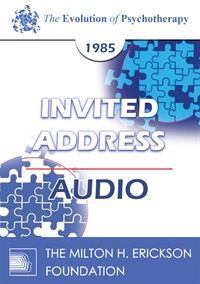
- Average Rating:
- Not yet rated
- Topic Areas:
- Invited Addresses | Psychotherapy | History of Psychotherapy | Family Therapy
- Categories:
- Evolution of Psychotherapy | Evolution of Psychotherapy 1985 | Pioneers in Couples and Family Therapy
- Faculty:
- Murray Bowen, MD | James F. Masterson, MD
- Duration:
- 1:32:08
- Format:
- Audio Only
- Original Program Date:
- Dec 12, 1985
- Short Description:
- Murray Bowen explores psychotherapy's evolution, tracing its roots in family dynamics and brain development, critiquing modern psychiatric trends while advocating for comprehensive, knowledge-driven therapeutic approaches. Discussant James Masterson complements Bowen's analysis, highlighting emerging research in child psychiatry and the importance of interdisciplinary understanding in mental health. Moderated by Sharon Cotter.
- Price:
- $15.00 - Base Price
- Average Rating:
- Not yet rated
- Topic Areas:
- Invited Addresses | Family Therapy | Psychotherapy | Supervision | Therapist Development | History of Psychotherapy
- Categories:
- Evolution of Psychotherapy | Evolution of Psychotherapy 1985 | Pioneers in Couples and Family Therapy
- Faculty:
- Salvador Minuchin, MD | Zerka Moreno
- Course Levels:
- Master Degree or Higher in Health-Related Field
- Duration:
- 1:20:57
- Format:
- Audio and Video
- Original Program Date:
- Dec 12, 1985
- Short Description:
- This conversation brings together two influential voices reflecting on the development of family therapy. Salvador Minuchin traces its shift from holistic, family-focused care to an individual diagnostic model, and back again. He underscores the importance of adapting therapeutic strategies to the family’s structure and context. Zerka Moreno shares the power of action-oriented methods like psychodrama, highlighting how family members often relate more to imagined roles than to one another. Moderated by Sharon Cottor, MSW.
- Price:
-
Sale is $29.00
price reduced from Base Price - $59.00





